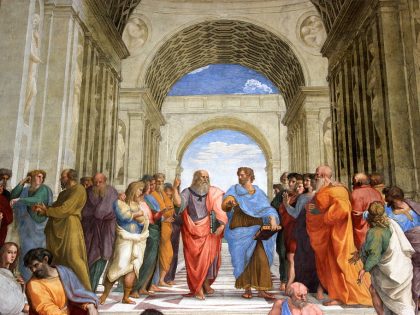
What It Means to Be a Marxist
We can only change the world if we understand the actual forces around us. Marxism gives us the tools to do just that.

We can only change the world if we understand the actual forces around us. Marxism gives us the tools to do just that.

When the great radical thinker Sheldon Wolin died this week, he left behind a singular approach to political theory.

Alasdair MacIntyre’s original critique of liberal modernity has won followers on the Left and the Right. His account of how capitalism has undermined the conditions of human flourishing deserves the serious attention of socialists.

Thomas Sowell has been a titan of conservative politics for decades. Underneath the erudition and prolific output is a cynical thinker who puts an intellectual gloss on social domination.

In his refutation of the famous libertarian arguments of Robert Nozick’s Anarchy, State, and Utopia, socialist thinker G. A. Cohen showed the absurdity of thinking that we had to accept an unequal society in order to preserve liberty.

Analytic philosophy has become the dominant school in anglophone philosophy departments since 1945. Christoph Schuringa persuasively argues that it has served to reinforce a liberal common sense that blocks the idea of radical change.

With a vacuous social vision, economics confronts the “return of the social question” woefully unprepared.

A decade ago, The Wire series finale aired. The show was a Marxist's idea of what TV drama should be.

Libertarianism offers no solution to today's plutocratic politics — it's nothing more than a reactionary rejection of political struggle.

Marxist philosopher Étienne Balibar sits down with Jacobin to discuss freedom and democracy — and why socialists need to reclaim those words from the Right.

Perry Anderson’s essays on the history of Marxism show his dazzling erudition and breadth of historical vision. But the British Marxist’s work has also been deeply shaped by his changing political outlook, as his 1960s hopes in socialist revolution have given way to a more sober reading of capitalism’s crises.

Christoph Schuringa insists that analytic philosophy serves as an ideological fig leaf for liberal capitalism. But his polemic distorts the discipline’s history and fails to draw persuasive links between its development and apologias for the status quo.

The Economist’s liberalism is often framed as the politics of human rights and individual freedom, but its origins lie just as much in a fear of the masses and democracy.

Analytic philosophy, the hegemonic branch of the discipline in the US, often thinks of itself as above history and politics. But its rise, and its enduring influence, are owed to McCarthyism, which purged radicals from postwar philosophy.

Conservative thinkers like Roger Scruton defend traditional hierarchies as natural and inescapable. But our social order is the product of human decisions — and it can be remade to benefit the many rather than the few.

The first season of The Wire began 20 years ago this month. It remains one of this century's great television shows — both stylish and smart, with unforgettable characters woven into a striking portrait of the depredations of capitalism in one US city.

Frustrated with the state of America, some on the Right have come to embrace postliberalism, an ideology that seeks to invigorate conservative politics by rejecting equality.
A new crop of Cold War spy dramas revels in the thrill of crossing enemy lines more than depicting political realities.

We need our social theory to be rigorous and accessible. At least one side of the debate over Vivek Chibber’s recent book does that.